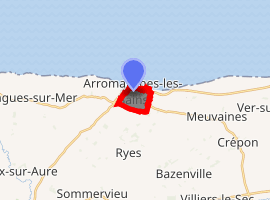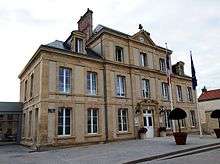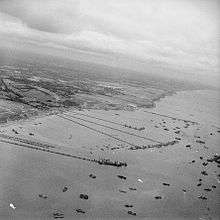Arromanches-les-Bains
Arromanches-les-Bains (or simply Arromanches) is a commune in the Calvados department in the Normandy region of north-western France.
Arromanches-les-Bains | |
|---|---|
 Arromanches, with the remains of the Mulberry harbour in its bay | |
.svg.png) Coat of arms | |
Location of Arromanches-les-Bains 
| |
 Arromanches-les-Bains  Arromanches-les-Bains | |
| Coordinates: 49°20′24″N 0°37′16″W | |
| Country | France |
| Region | Normandy |
| Department | Calvados |
| Arrondissement | Bayeux |
| Canton | Courseulles-sur-Mer |
| Intercommunality | CC Bayeux Intercom |
| Government | |
| • Mayor (2014-2020) | Patrick Jardin |
| Area 1 | 13.7 km2 (5.3 sq mi) |
| Population (2017-01-01)[1] | 489 |
| • Density | 36/km2 (92/sq mi) |
| Time zone | UTC+01:00 (CET) |
| • Summer (DST) | UTC+02:00 (CEST) |
| INSEE/Postal code | 14021 /14117 |
| Elevation | 0–55 m (0–180 ft) (avg. 15 m or 49 ft) |
| 1 French Land Register data, which excludes lakes, ponds, glaciers > 1 km2 (0.386 sq mi or 247 acres) and river estuaries. | |
The inhabitants of the commune are known as Arromanchais or Arromanchaises.[2][3]
Geography
Arromanches-les-Bains is 12 km north-east of Bayeux and 10 km west of Courseulles-sur-Mer on the coast where the Normandy landings took place on D-Day, 6 June 1944. Access to the commune is by the D514 road from Tracy-sur-Mer in the west passing through the town and continuing to Saint-Côme-de-Fresné in the east. The D87 road also goes from the town south to Ryes. The D65 road goes east to Meuvaines. About a third of the commune is the urban area of the town with the rest farmland.[4]
History
Arromanches is remembered as a historic place of the Normandy landings and in particular as the place where a Mulberry harbour artificial port was installed. This artificial port allowed the disembarkation of 9,000 tons of material per day.
It was on the beach of Arromanches that, during the Invasion of Normandy immediately after D-Day, the Allies established an artificial temporary harbour to allow the unloading of heavy equipment without waiting for the conquest of deep water ports such as Le Havre or Cherbourg. Although at the centre of the Gold Beach landing zone, Arromanches was spared the brunt of the fighting on D-Day so the installation and operation of the port could proceed as quickly as possible without damaging the beach and destroying surrounding lines of communication. The port was commissioned on 14 June 1944.
This location was one of two sites chosen to establish the necessary port facilities to unload quantities of supplies and troops needed for the invasion during June 1944, the other was built further West at Omaha Beach. The British built huge floating concrete caissons which, after being towed from England, then had to be assembled to form walls and piers forming and defining the artificial port called the Mulberry harbour. These comprised pontoons linked to the land by floating roadways. One of these ports was assembled at Arromanches and even today sections of the Mulberry harbour still remain with huge concrete blocks sitting on the sand and more can be seen further out at sea.
Some key figures: by 12 June 1944 more than 300,000 men, 54,000 vehicles, 104,000 tons of supplies had been landed. During 100 days of operation of the port 2.5 million men, 500,000 vehicles, and 4 million tons of material were landed. The best performance of the port was in the last week of July 1944: during those seven days the traffic through Arromanches exceeded 136,000 tons or 20,000 tons per day.
Today, Arromanches is mainly a tourist town. Situated in a good location for visiting all of the battle sites and war cemeteries, there is also a museum at Arromanches with information about Operation Overlord and in particular, the Mulberry harbours.[5]
On 21 September 2013 Bradford-based sand sculpting company Sand in Your Eye created a tribute called "The Fallen 9,000". It was a temporary sculpture project—a visual representation of 9,000 people drawn in the sand which equates the number of civilians, German forces and Allies that died during the D-day landings. It coincided with Peace Day, and was washed away with the tide at the end of the day.[6]
Heraldry
.svg.png) Arms of Arromanches-les-Bains |
Blazon: Azure, an anchor of Or debruised by a mullet of Argent between two chains of Sable posed in chevron inverted broken, in chief Gules debruised by a leopard of Or armed and tongued Azure. |
Administration

List of Successive Mayors[7]
| From | To | Name | Party | Position |
|---|---|---|---|---|
| 1995 | 2020 | Patrick Jardin | Optician |
(Not all data is known)
Demography
In 2010 the commune had 587 inhabitants. The evolution of the number of inhabitants is known from the population censuses conducted in the commune since 1793. From the 21st century, a census of communes with fewer than 10,000 inhabitants is held every five years, unlike larger towns that have a sample survey every year.[Note 1]
| 1793 | 1800 | 1806 | 1821 | 1831 | 1836 | 1841 | 1846 | 1851 |
|---|---|---|---|---|---|---|---|---|
| 430 | 363 | 450 | 493 | 520 | 534 | 528 | 500 | 490 |
| 1856 | 1861 | 1866 | 1872 | 1876 | 1881 | 1886 | 1891 | 1896 |
|---|---|---|---|---|---|---|---|---|
| 502 | 505 | 533 | 532 | 544 | 481 | 480 | 455 | 444 |
| 1901 | 1906 | 1911 | 1921 | 1926 | 1931 | 1936 | 1946 | 1954 |
|---|---|---|---|---|---|---|---|---|
| 444 | 380 | 335 | 273 | 282 | 288 | 262 | 282 | 287 |
| 1962 | 1968 | 1975 | 1982 | 1990 | 1999 | 2006 | 2010 | - |
|---|---|---|---|---|---|---|---|---|
| 298 | 339 | 355 | 395 | 409 | 552 | - | 587 | - |

Culture and heritage
Civil heritage
The commune has many buildings and sites that are registered as historical monuments:
- Houses (19th century)

- The Notre-Dame-des-Flots Monument at Rue du Calvaire (1911)

- The Grand Hotel at 22 Rue du Maréchal Joffre (20th century)

- The old Radar Station at Le Callouet (20th century)

- The Château du Petit Fontaine (1764)

- An Orientation table (20th century)

- The Artificial Harbour and Winston Churchill Harbour (20th century)

- The 6 June 1944 Museum (1954)

- A Lavoir (Public laundry) (1896)

- The Town Hall and Boys' Primary School (1884)

- The Village (Antiquity)

- Houses and Hotels (18th-20th century)

- Other sites of interest
- The Museum of the Landings
- Arromanches 360 degrees
Religious heritage
The commune has several religious buildings and sites that are registered as historical monuments:
A Presbytery at 4 avenue de l'Amiral Mountbatten (1836)![]()
A Monumental Cross at Rue du Calvaire (1901)![]()
A Cemetery (1857)![]()
The Parish Church of Saint Peter (19th century)![]()
- Stained glass windows (19th-20th century)

- Ciboria (19th century)

- A Paten (19th century)

- A Monstrance (19th century)

- A Chalice (19th century)

- A Box for Oil for the sick (20th century)

- An Ex-voto Painting: Fishermen in danger (19th century)

- A Painting: Saint Peter (19th century)

- A Painting: Saint Paul (19th century)

- A Cross: Christ on the Cross (19th century)

- A Table (17th century)

- 34 Pews (19th century)

- The Choir bench and wood panelling (19th century)

- A Pulpit (19th century)

- A Baptismal font (19th century)

- An Altar, Tabernacle, and Retable (19th century)

- An Altar (1976)

- An Altar (1) (18th century)

- The Furniture in the Church

Picture gallery
 Arromanches-les-Bains Panorama
Arromanches-les-Bains Panorama Remains of the Mulberry harbour on the beach
Remains of the Mulberry harbour on the beach Arromanches railway station around 1901
Arromanches railway station around 1901- View of the beach
 Arromanches town
Arromanches town- The cliffs along the coast
 Remains of German defences and the Mulberries in the background
Remains of German defences and the Mulberries in the background- The Lavoir (public laundry)
 Arromanches memorial
Arromanches memorial The Museum of the Landings
The Museum of the Landings Mulberry harbour in operation (1944)
Mulberry harbour in operation (1944) Commemorative plaque
Commemorative plaque Arromanches from Cape Manvieux
Arromanches from Cape Manvieux A "whale pier" bridge element from the Mulberry harbour on display since 2004
A "whale pier" bridge element from the Mulberry harbour on display since 2004 The Mulberry harbour in June 1944
The Mulberry harbour in June 1944 Winston Churchill at Arromanches 21–23 July 1944
Winston Churchill at Arromanches 21–23 July 1944 Aerial view of the Mulberry harbour in September 1944
Aerial view of the Mulberry harbour in September 1944 Sherman tank displayed at Arromanches
Sherman tank displayed at Arromanches- Arromanches Church
 Church of Saint Peter
Church of Saint Peter.jpg) Sunset at Arromanches
Sunset at Arromanches
Notable people linked to the commune
- Jules Carpentier, French inventor. A main street is named in his honour.
- François Carpentier, son of Jules Carpentier, French architect and mayor of the commune. He created the Museum of the Landings in Arromanche.
- Sylvie Joly owned a villa in the commune. Her father was mayor of the commune from 1947 to 1963.
- The Boisgelin family owned a large part of the commune and still have a large house.
See also
- Communes of the Calvados department
- Mulberry harbour
- Arromanches (French aircraft carrier)

Notes
- At the beginning of the 21st century, the methods of identification have been modified by Law No. 2002-276 of 27 February 2002 Archived 6 March 2016 at the Wayback Machine, the so-called "law of local democracy" and in particular Title V "census operations" allows, after a transitional period running from 2004 to 2008, the annual publication of the legal population of the different French administrative districts. For communes with a population greater than 10,000 inhabitants, a sample survey is conducted annually, the entire territory of these communes is taken into account at the end of the period of five years. The first "legal population" after 1999 under this new law came into force on 1 January 2009 and was based on the census of 2006.
References
- "Populations légales 2017". INSEE. Retrieved 6 January 2020.
- Inhabitants of Calvados (in French)
- Arromanches-les-Bains in the Competition for Towns and Villages in Bloom Archived December 10, 2014, at the Wayback Machine (in French)
- Google Maps
- Arromanches D-Day Museum homepage
- The Fallen 9000 info page
- List of Mayors of France (in French)
- Ministry of Culture, Mérimée IA00121719 House at 11 Rue de l'Abreuvoir IA00121720 House at 2 Rue de la Batterie IA00121720 Villa les Tourelles at 7 Rue de la Batterie




- Ministry of Culture, Mérimée IA00121714 Notre-Dame-des-Flots Monument at Rue du Calvaire (in French)
- Ministry of Culture, Mérimée IA00121733 Grand Hotel (in French)
- Ministry of Culture, Mérimée PA14000009 Radar Station (in French)
- Ministry of Culture, Mérimée IA00121736 Château du Petit Fontaine (in French)
- Ministry of Culture, Mérimée IA00121735 Orientation Table (in French)
- Ministry of Culture, Mérimée IA00121734 Artificial Harbour and Winston Churchill Harbour (in French)

- Ministry of Culture, Mérimée IA00121717 6 June 1944 Museum (in French)

- Ministry of Culture, Mérimée IA00121716 Lavoir (in French)
- Ministry of Culture, Mérimée IA00121715 Town Hall and Boys' Primary School (in French)
- Ministry of Culture, Mérimée IA00121709 Village (in French)

- Ministry of Culture, Mérimée IA00121708 Houses and Hotels (in French)

- Ministry of Culture, Mérimée IA00121718 Presbytery at 4 avenue de l'Amiral Mountbatten (in French)
- Ministry of Culture, Mérimée IA00121712 Monumental Cross at Rue du Calvaire (in French)
- Ministry of Culture, Mérimée IA00121713 Cemetery (in French)
- Ministry of Culture, Mérimée IA00121711 Parish Church of Saint Peter (in French)
- Ministry of Culture, Palissy IM14005208 Samaritan at the well and Nazareth Workshop IM14005201 Virgin at Prayer and Saint Joseph IM14001180 Prayers and offerings by Sailors to the Virgin(in French)

- Ministry of Culture, Palissy IM14001199 Ciborium for the sick IM14001198 Ciborium (1) IM14001197 Ciborium (2)(in French)

- Ministry of Culture, Palissy IM14001196 Paten (in French)
- Ministry of Culture, Palissy IM14001195 Monstrance (in French)
- Ministry of Culture, Palissy IM14001194 Chalice (in French)
- Ministry of Culture, Palissy IM14001193 Box for Oil for the sick (in French)
- Ministry of Culture, Palissy IM14001192 Ex-voto Painting: Fishermen in danger (in French)

- Ministry of Culture, Palissy IM14001191 Painting: Saint Peter (in French)

- Ministry of Culture, Palissy IM14001190 Painting: Saint Paul (in French)

- Ministry of Culture, Palissy IM14001189 Cross: Christ on the Cross (in French)
- Ministry of Culture, Palissy IM14001188 Table (in French)
- Ministry of Culture, Palissy IM14001187 34 Pews (in French)
- Ministry of Culture, Palissy IM14001186 Choir bench and wood panelling (in French)
- Ministry of Culture, Palissy IM14001185 Pulpit (in French)
- Ministry of Culture, Palissy IM14001184 Baptismal font (in French)
- Ministry of Culture, Palissy IM14001183 Altar, Tabernacle, and Retable (in French)
- Ministry of Culture, Palissy IM14001182 Altar (in French)
- Ministry of Culture, Palissy IM14001181 Altar (1) (in French)
- Ministry of Culture, Palissy IM14001179 Furmniture in the Church (in French)
External links
| Wikimedia Commons has media related to Arromanches-les-Bains. |
- Arromanches Tourist office website
- Photos and information on the Musée du Débarquement at Arromanches (in French)
- The Battle of Arromanches of 1811 on the History of Normandy website. (in French)
- Arromanches-les-Bains on Lion1906
- Aromanches on the 1750 Cassini Map